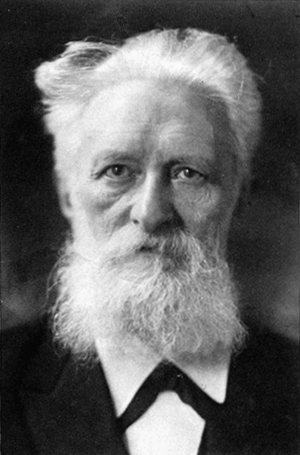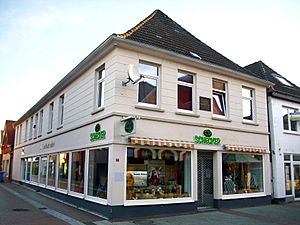Rudolf Christoph Eucken facts for kids
Quick facts for kids
Rudolf Christoph Eucken
|
|
|---|---|

Photograph by Rudolf Dührkoop
|
|
| Born | 5 January 1846 |
| Died | 15 September 1926 (aged 80) |
| Alma mater | Göttingen University Berlin University |
| Awards | Nobel Prize in Literature (1908) |
| Era | 19th-/20th-century philosophy |
| Region | Western philosophy |
| School | Continental philosophy German idealism |
| Institutions | University of Jena University of Basel |
|
Main interests
|
Ethics |
|
Notable ideas
|
Aktivismus (ethical activism) The Real |
|
Influences
|
|
|
Influenced
W. R. Boyce Gibson Abel J. Jones Evelyn Underhill |
|
| Signature | |
Rudolf Christoph Eucken (German pronunciation: [ˈʁuːdɔlf ˈʔɔʏkn̩]; 5 January 1846 – 15 September 1926) was an important German philosopher. He won the 1908 Nobel Prize in Literature. He received this award for his deep thinking and clear writing about how to live a good life. The Nobel committee recognized his strong search for truth and wide range of ideas.
Contents
Early Life and Education
Rudolf Eucken was born on January 5, 1846, in Aurich, Germany. His father passed away when Rudolf was very young. His mother, Ida Maria, raised him.
He went to school in Aurich. One of his teachers was Ludwig Wilhelm Maximilian Reuter. Reuter was a scholar who studied ancient languages and history.
Eucken later studied at Göttingen University from 1863 to 1866. There, he learned from Hermann Lotze, another famous thinker. He also studied at Berlin University. At Berlin, Friedrich Adolf Trendelenburg was a professor who greatly influenced Eucken's ideas about ethics and history.
His Career as a Professor
In 1866, Eucken earned his PhD degree. This is a high academic degree. He got it from Göttingen University. His main study was about classical languages and ancient history.
After teaching at schools for five years, Eucken became a professor. In 1871, he was named Professor of Philosophy at the University of Basel in Switzerland. He took over from one of his old teachers, Gustav Teichmüller. He even got the job over the famous philosopher Friedrich Nietzsche!
Eucken stayed in Basel until 1874. Then, he moved to the University of Jena in Germany. He worked there as a professor until he retired in 1920.
He also taught internationally. In 1912 and 1913, Eucken was an exchange professor at Harvard University in the United States. He also gave lectures at New York University. During World War I, Eucken supported his country's actions, like many other professors at the time.
What He Believed: Ethical Activism
Eucken's philosophy had two main parts. One part looked at history, and the other part built new ideas. He believed that philosophical ideas are always connected to the time they come from.
He thought that philosophy should be about "life." It's not just about thinking, but about using spiritual inspiration to solve real-world problems. Eucken called this practical way of thinking "ethical activism." This means actively working to live a good, meaningful life.
Because of this belief, Eucken cared a lot about social issues and education. He taught that people have souls. This means humans are a mix of nature and spirit. He believed people should always try to improve their spiritual side. This effort to achieve a more spiritual life was another key part of his ethical activism.
Later Life and Family
Rudolf Eucken married Irene Passow in 1882. They had a daughter and two sons. His son, Walter Eucken, became a well-known economist. His other son, Arnold Eucken, was a chemist and physicist.
Rudolf Eucken passed away on September 15, 1926, in Jena, Germany. He was 80 years old.
Important Books
Rudolf Eucken wrote many books. Some of his most famous works include:
- The Problem of Human Life as Viewed by the Great Thinkers (1909)
- The Struggle for a Spiritual Content of Life (1896)
- The Truth of Religion (1901)
- Life's Basis and Life's Ideal: The Fundamentals of a New Philosophy of Life (1907)
- The Meaning and Value of Life (1908)
- Main Currents of Modern Thought (1908)
- Can We Still Be Christians? (1911)
- Socialism: an Analysis (1920)
These books show his ideas about how people can find meaning and live a spiritual life.
Images for kids
See Also
 In Spanish: Rudolf Christoph Eucken para niños
In Spanish: Rudolf Christoph Eucken para niños
 | Toni Morrison |
 | Barack Obama |
 | Martin Luther King Jr. |
 | Ralph Bunche |


